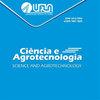土壤耕作方式和接种巴西偶氮螺旋菌是否影响玉米基因型的表现?
IF 0.9
4区 农林科学
Q2 AGRICULTURE, MULTIDISCIPLINARY
引用次数: 0
摘要
摘要玉米(Zea mays L.)生产的瓶颈之一是对氮肥的大量需求,这给农民带来了负担。解决这个问题的方法是使用巴西偶氮螺旋菌作为接种剂。然而,关于这种接种剂的实验结果因所使用的土壤栽培方法而异。本研究旨在评价接种巴西氮螺旋菌对两种免耕制度下3个基因型玉米形态生理特性和产量特性的影响。以休耕土(FS)为对照。结果表明,与接种巴西氮螺旋菌相比,土壤栽培对其形态生理和生产参数有显著影响。不同处理间无明显形态生理差异。在两个淡季,FS(接种或未接种)与产量参数(籽粒产量- yi、百粒重- 100sw、株高- ph和叶数- nl)的关系比NT更密切。杂交种中,Dekalb 255 PRO3 (DKB 255)的YI和sw最高。因此,这种杂交品种被认为很好地适应了巴西帕拉纳本文章由计算机程序翻译,如有差异,请以英文原文为准。
Does soil cultivation practices and inoculation with Azospirillum brasilense affect the performance of maize genotypes?
ABSTRACT One of the bottlenecks for maize (Zea mays L.) production is the need for a large supply of nitrogen fertilizers, which burdens farmers. A solution to this problem is the use of proteobacteria Azospirillum brasilense as an inoculant. However, experimental results regarding this inoculant vary depending, for instance, on the soil cultivation practices used. The objective of this study was to evaluate the influence of inoculation with Azospirillum brasilense on morphophysiological characters and yield characteristics of three maize genotypes in two off-season cultivated in no-tillage system (NT). Fallow soil (FS) was used as control. The results showed that soil cultivation had a significant effect on morphophysiological and productivity parameters compared to inoculation with Azospirillum brasilense. There were no distinct morphophysiological differences among the treatments. FS (inoculated or not) was more closely related to productivity parameters (grain yield-YI, weight of 100 seeds-100SW, plant height-PH and number of leaves-NL) than NT in both off-seasons. Among the hybrids, Dekalb 255 PRO3 (DKB 255) showed the highest YI and 100SW. Thus, this hybrid was considered well-adapted to off-seasons in western Paraná, Brazil. The inoculation effect was practically null and did not influence the estimated productivity of the different chosen hybrids.
求助全文
通过发布文献求助,成功后即可免费获取论文全文。
去求助
来源期刊

Ciencia E Agrotecnologia
农林科学-农业综合
CiteScore
2.30
自引率
9.10%
发文量
19
审稿时长
6-12 weeks
期刊介绍:
A Ciência e Agrotecnologia, editada a cada 2 meses pela Editora da Universidade Federal de Lavras (UFLA), publica artigos científicos de interesse agropecuário elaborados por membros da comunidade científica nacional e internacional.
A revista é distribuída em âmbito nacional e internacional para bibliotecas de Faculdades, Universidades e Instituições de Pesquisa.
 求助内容:
求助内容: 应助结果提醒方式:
应助结果提醒方式:


